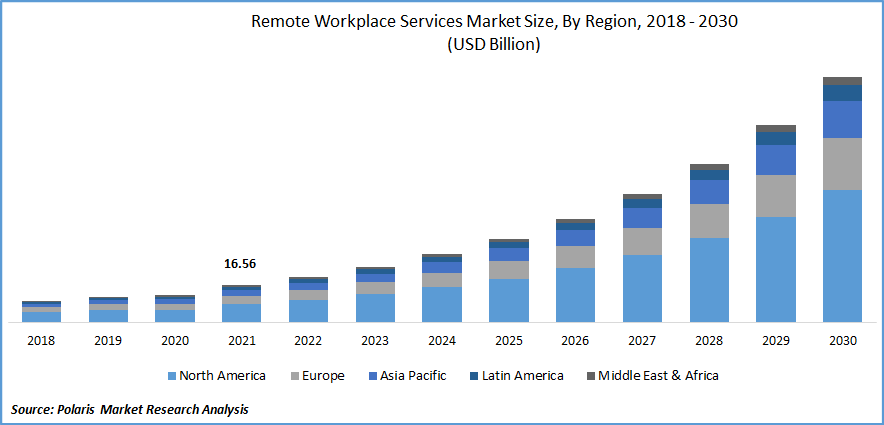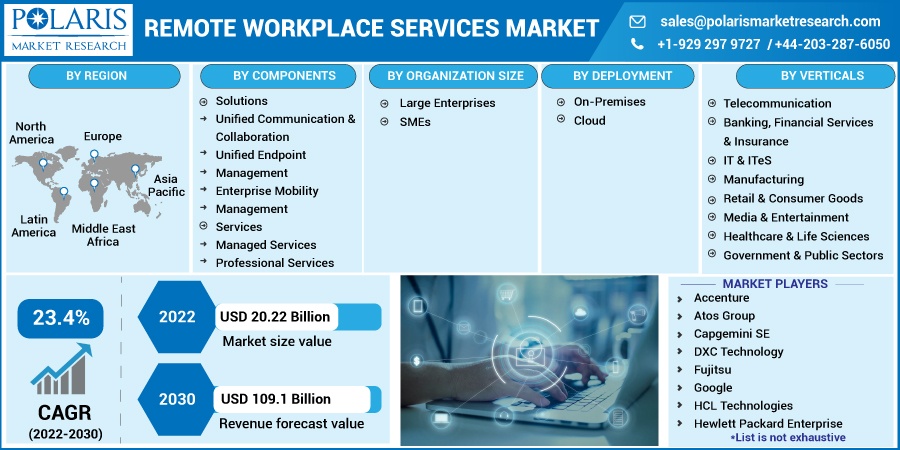
Remote Workplace Services Market Share, Size, Trends, Industry Analysis Report, By Components; By Organization Size (Large Enterprises, SMEs); By Deployment (On-Premises, Cloud); By Verticals; By Region; Segment Forecast, 2022-2030
- Published Date:Nov-2022
- Pages: 117
- Format: PDF
- Report ID: PM2740
- Base Year: 2021
- Historical Data: 2018-2020
Report Outlook
The global remote workplace services market was valued at USD 16.56 billion in 2021 and is expected to grow at a CAGR of 23.4% during the forecast period. The growing demand for remote workplace services is expected to be driven by rapid digitization, rising demand for better work-life balance, and technological transformation to create a digital workplace.

Know more about this report: Request for sample pages
Remote workplaces enable employees to operate data and perform their responsibilities outside office premises. In addition, these services improve organizational mobility that enables people to work seamlessly across physical, virtual, and locations with a proper network which is a considerable factor propelling the market growth.
The COVID-19 pandemic positively influenced the growth of the remote workplace services market. The pandemic hit many industries, which resulted in vendors providing services remotely to maintain their position in such crises. The covid has led to economic uncertainty, emphasizing that various departments and organizations adopt the remote solution to interact, transfer data and maintain work continuity, accelerating market growth.
Various SMEs are adopting cloud services such as infrastructure as a service (IaaS), platform as a service (PaaS), and software as a service (SaaS) to perform work efficiently and smoothly and to improve the work environment. But these services have many securities-related issues while deployed, which might leak essential data of any organization; such data loss factors are restraining the market growth.
 Know more about this report: Request for sample pages
Know more about this report: Request for sample pages
Industry Dynamics
Growth Drivers
The global market is likely to be driven by rising investment by various organizations for workplace transformation and the adoption of cloud-based services to enable remote working from any location with secured access. In addition, improving digital technology of smart assets to engage and motivate employees to work efficiently is also expected to spur the market.
Furthermore, these technologies are already embedded with data that could be accessed by the organization’s employees from office premises or remotely, which ultimately increases productivity and operational flexibility and provides a better employee experience; such factors are the primary reasons to accelerate the market growth.
Moreover, the demand for remote working is also rising owing to the lower overhead expenses incurred by the organization. Businesses tend to pay less for office spaces, computers, and air conditioning and save money on utilities and rents as most employees work from home; these factors support the market growth.
Report Segmentation
The market is primarily segmented based on components, organization size, deployment, verticals, and region.
|
By Components |
By Organization Size |
By Deployment |
By Verticals |
By Region |
|
|
|
|
|
Know more about this report: Request for sample pages
Services Segment Accounted for the Largest Share in 2021
The services segment accounted for the highest revenue share in 2021, ensuring visibility and security related to all business functions. The services segment includes training, support & maintenance, consulting services, and integration & implementation services, which align digital workplaces more efficiently and effectively and propel market growth.
Moreover, managed services offer professional network support & maintenance and consistent monitoring of the system to prevent failure in the businesses. Furthermore, professional services deliver procedures and enhance technology-based learning, which helps to monitor and fix issues remotely; such factors are expected to accelerate the segment's growth.
Large Enterprises are Expected to Spearhead the Market Growth
The growing adoption of workplace services in large enterprises due to its financial stability and rising investment to adopt digital tools equipped with artificial intelligence is expected to boost segment growth.
In addition, many key players are adopting cloud technology and automation software to meet the demand for remote employees, which is an essential factor supporting market growth. For instance, Dell Technologies created a flex-work program named connected workplace to organize their work and meet both professional and personal requirements; such factors improve the working environment and embrace the performance of the business, and such factors are expected to bolster the segment growth.
Cloud Technology is Expected to Witness a Higher Growth Rate Over the Forecast Period
The demand for cloud technology is expected to surge significantly over the forecast period owing to the increasing adoption in various large and SME organizations. Rapid digitization has led to increasing investment by many businesses to upgrade their infrastructure and application, driving the market growth.
In addition, this technology makes collaboration more accessible, and data can be shared securely with the team members in the organization. Moreover, the deployment of cloud services is cost-efficient, requiring less installation time, which ensures businesses complete daily tasks and flexibly streamlines operations, which is accelerating market growth.
IT and ITES Segment is Expected to Account for the Largest Share
IT & IT-enabled services (ITeS) segment is expected to dominate the market over the forecast period as the growing trend for remote working post-pandemic has resulted in increasing adoption of a digital workplace.
In addition, many organizations are outsourcing their operation and mobility to various managed service providers to enhance their competencies and productivity remotely, which is a significant factor leading the market. For instance, Infosys launched four digital platforms for consulting and outsourcing named launchpad, LEX, meridian, and InfyMe for better user and employee experience and are adapted to the changing workplace; such factors are expected to drive the market growth.
North America is Expected to Dominate and Account for the Largest Market Share
North America is the largest region for remote workplace services and is expected to witness faster growth over the forecast period owing to the rising government initiatives to boost innovation and improve enterprise mobility across Canada and the U.S. In addition, the rising adoption of novel technologies equipped with artificial intelligence and bring your own device (BYOD) is also supporting the market growth. Moreover, the manufacturing sector is adopting much automated and robotics software for their operation, bolstering the market growth.
Competitive Insight
Some of the major players operating in the global market include Accenture, Atos Group, Capgemini SE, DXC Technology, Fujitsu, Google, HCL Technologies, Hewlett Packard Enterprise, IBM Corporation, Infosys Limited, Microsoft, Mphasis, NTT Data Corporation, Tata Consultancy Services Limited, Tech Mahindra Limited, TRIANZ, Unisys Corporation, VMware, Inc., Wipro Limited, and, Zensar.
Recent Developments
In September 2022, Cognition partnered with NTT data corporation to expand its workforce readiness and risk management services. This partnership provides clients with a powerful, laser-focused tool to generate scalable, realistic, and behavioral change at scale.
In June 2022, Infosys collaborated with TK elevators to enhance the user experience for employees with the help of AI-powered IT helpdesk services, digital workplace management, and network services based on Infosys cobalt.
Remote Workplace Services Market Report Scope
|
Report Attributes |
Details |
|
Market size value in 2022 |
USD 20.22 billion |
|
Revenue forecast in 2030 |
USD 109.1 billion |
|
CAGR |
23.4% from 2022 - 2030 |
|
Base year |
2021 |
|
Historical data |
2018 - 2020 |
|
Forecast period |
2022 - 2030 |
|
Quantitative units |
Revenue in USD billion and CAGR from 2022 to 2030 |
|
Segments Covered |
By Component, By Organization Size, By Deployment, By Verticals, By Region |
|
Regional scope |
North America, Europe, Asia Pacific, Latin America, Middle East & Africa |
|
Key Companies |
Accenture, Atos Group, Capgemini SE, DXC Technology, Fujitsu, Google, HCL Technologies, Hewlett Packard Enterprise, IBM Corporation, Infosys Limited, Microsoft, Mphasis, NTT Data Corporation, Tata Consultancy Services Limited, Tech Mahindra Limited, TRIANZ, Unisys Corporation, VMware, Inc., Wipro Limited, and, Zensar. |
